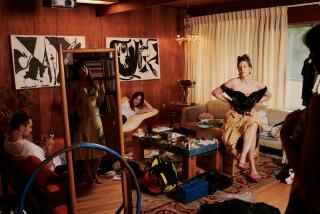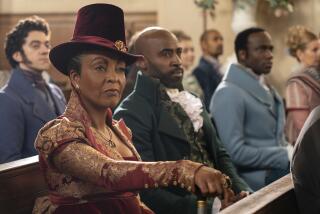‘Bridgerton’ is full of secrets. We asked insiders to decode the biggest surprises
The scandal of Netflix’s “Bridgerton” is built on a secret.
Marina Thompson, played by Ruby Barker, is unmarried and pregnant. And when Regency England’s high society — known as the “ton” — learns of her “condition,” it sends waves of shock up their spines and those of the viewers.
But to the careful observer, Marina’s “condition” is a secret that hides in plain sight. She wears a “lover’s eye” necklace. An “eye miniature,” or tiny portrait of her lover’s eye, hangs around her neck on a strand of pearls.
That eye reveals the identity of Sir George Crane, Marina‘s longtime lover, who is away fighting the Peninsular War in Spain. Despite Sir George, Marina’s father sends the young woman to stay with her upper-crust family, the Featheringtons, in London — with the sole purpose of finding a suitable husband.
The “lover’s eye” necklace is one of a handful of masterfully planted Easter eggs carefully constructed by the show’s costume designers, John Glaser and Ellen Mirojnick, to broadcast stealthy messages about the world of Regency England built by the show’s creator, Chris Van Dusen.
Glaser discovered lover’s eye jewelry while researching “the perfect accessory for secret affairs.” He brought the idea back to the members of the costume department. They were so enchanted that they even tested it on other characters in different scenarios, including protagonist Daphne Bridgerton (Phoebe Dynevor), who has a “connection” with Simon Basset, Duke of Hastings (Regé-Jean Page).
“We tried eye bracelets, we tried eye necklaces,” Mirojnick told The Times. “We tried eye printing in different types of things. We kind of ran away with the motif. … It’s seductive in a way. It’s a little hidden gem.”
Marina’s costumes and more came straight out of the “lookbook” that Mirojnick and Glaser put together for the show. Each page of the book contains reference images: something historically accurate, something from another time period (often the 1960s) and something modern.
“I work from the broad stroke, the whole entire canvas, and go in,” Mirojnick said. “And I love working that way, because then you’re open to finding so many different ideas, and you go down a rabbit hole that can be just filled with prizes for you to be able to include.”
The costume department pulled apart “Bridgerton’s” 1813 setting and questioned where the show’s historical counterparts would have gotten their inspiration. Regency England looked to fashionable France, Glaser said, where Napoleon drew influences from the ancient Greeks and Romans.
“Everything always is cyclical,” Mirojnick said. “Everything always comes back in some version of itself.”
Napoleon’s first wife, Empress Joséphine Bonaparte, was pregnant around this time. She raised the waistline of her dresses to be under her bust (rather than around her pregnant belly), popularizing the empire waist that most of the show’s women wear.
“Joséphine being pregnant could be the Easter egg that actually launched ‘Bridgerton,’” Mirojnick said.
But the empress’ influence was not, of course, the only nugget in the wildly popular series. And each hidden gem required precise coordination to bring it to life.
For the lover’s eye necklace, the costume department called London-based costume props and jewelry maker Lorenzo Mancianti. He had worked with Mirojnick previously on “Maleficent: Mistress of Evil,” carefully crafting studded armor and the jewels that adorned Queen Ingrith (Michelle Pfeiffer). His impressive résumé includes work on Disney’s live-action “Aladdin” in 2019 and “Star Wars: The Last Jedi” in 2017.
“Lorenzo is a costume jeweler and costume prop maker,” Mirojnick said. “Which is different than just saying … we had a jeweler on our costume team. No, we had Lorenzo. … He is a genius. He can figure out anything. And has the patience of a saint, and talents like Michelangelo.”
From the Duke of Hastings to Daphne to the modiste, each character harbors their own secrets. And each secret reveals something about their nature. The Duke, for instance, who has the reputation of a “rake” and the personality of a softboi, quietly wears his late mother’s diamond- and emerald-encrusted enamel brooch throughout the series.
“It was part of his signature,” Mirojnick said. “He traveled the world with it. And he never wanted to do without it. He always kept her close to his heart.”
The first time the Duke gallops into a scene, he wears a purple waistcoat with rough gold embroidery. The rich brocade fabrics and deep jewel tones, from which he shifts over time, allude to his travels. He’s dashing and he’s a rogue at the same time. “He is a man unto himself and did not want any part of the ton society,” Mirojnick said. “But what is lovely [is] that he comes back in a way that I think he’s a man who’s traveled the world … whether it had been Morocco, Western Africa, other parts of Europe, etc. And he brings with him his findings.”
The Duke’s love interest, Daphne Bridgerton, is his costuming foil: She shifts toward darker, richer tones, rather than away from them. Her signature, a powder-blue empire waist dress, hints at the naivety of Cinderella.
“The blues, in the beginning, they’re very soft and powdery,” Mirojnick said. “And I think they embrace her innocence when we first meet her. She’s definitely an English rose. She’s beautiful. She’s like a porcelain doll. There is an innocence about her — there’s a purposefulness — but an innocence.”
Daphne quickly evolves toward maturity — and so do her colors. She shifts from powdery pastels toward more regal purples and reds.
As for Genevieve Delacroix (Kathryn Drysdale), the dressmaker, her character — or at least her costuming — was loosely based on Coco Chanel, known for championing the Little Black Dress.
“We kept saying that she was based on Coco Chanel,” Glaser said. “When actual people in the theater world or in the fashion world go to a fitting, they usually wear black, so that the person that you’re fitting is the focus.”
The dressmaker, like Eloise Bridgerton (Claudia Jessie), also teased the line between masculine and feminine. Outside of her shop, at a dark and wild party, she emerges in trousers and a man’s shirt over her heaving corset. That party, like the show as a whole, eases the viewer into the rich escapism its audience has come to love.
“What we were creating was this beautiful illusion of the time and the place, with a fluidity and a romance to it,” Mirojnick said. “And that was what was most important: That we can take you to a place that you hadn’t been before.”
More to Read
Sign up for The Wild
We’ll help you find the best places to hike, bike and run, as well as the perfect silent spots for meditation and yoga.
You may occasionally receive promotional content from the Los Angeles Times.











